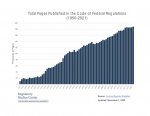The radical presidency of Obama, Biden, and Trump can be distinguished from the “reconstructive” presidency of leaders like George Washington, Andrew Jackson, Abraham Lincoln, William McKinley, and Franklin Delano Roosevelt. These leaders transformed American society chiefly through inspiring legislation in Congress that was supported by at least some members of both major parties in their day. The new structures that they created by working with Congress were ratified and adopted in many details by successor presidents who belong to rival parties. In the 20th century, Dwight Eisenhower and Richard Nixon ratified most of the institutions and policies of FDR’s New Deal. In the 1990s, Bill Clinton and his Democratic allies followed the turn toward the free market economics of Ronald Reagan and George H. W. Bush, promoting Bush’s North American Free Trade Agreement and abolishing a federal social insurance program, Aid to Families with Dependent Children.
This seems to be a popular topic around here. We have legislators who won't legislate and presidents who try to make up for it with an avalanche of EOs. What can be done about this? This article is an excellent intro to the topic, IMO.In the age of the radical presidency, such new foundings seem impossible, for now. Instead, what we appear to be heading toward, or living through, is a series of temporary, elective dictators, who not only reverse the decrees of their predecessors by their own decrees but also, in some cases, mobilize the machinery of justice to try to bankrupt or jail their rivals, including former presidents and presidential candidates. With each “presidente” surpassing the last one in usurpations of legislative power, the decline of the United States into an unstable and lawless Latin American-style banana republic is accelerating.




